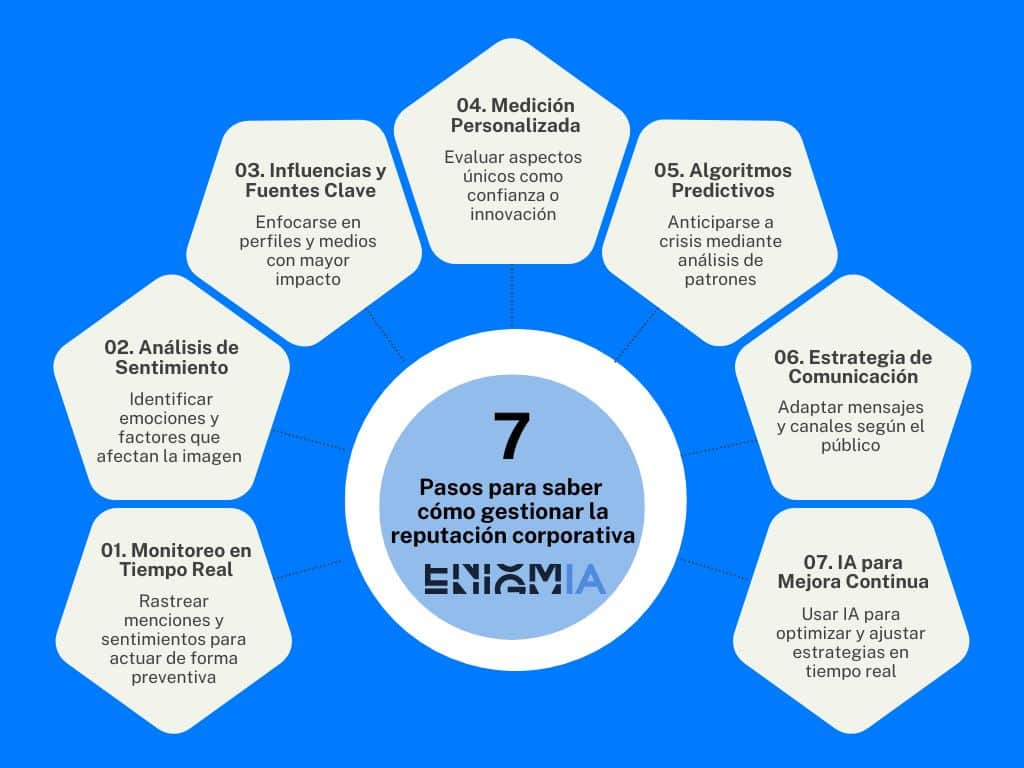What is corporate reputation?
The corporate reputation is the general perception that different stakeholders -customers, employees, investors and society in general- have of a company. This perception is built on their experiences, the actions of the organization and the image and values that the company projects in a sustained manner. Reputation is, in essence, an intangible asset that encapsulates the emotional and rational value that audiences associate with the brand.
Building a good corporate reputation requires time and consistency, as it depends on the coherence between what the company communicates and how it acts. In a context where information circulates in an immediate and accessible manner, reputation management has become critically important. Moreover, with the rise of the online reputationIn the digital environment, maintaining a solid image in the digital environment has become a priority, since the opinions and comments of users on social networks, blogs and forums have a significant impact on brand perception.
This is where the artificial intelligence (AI) becomes a strategic tool. Thanks to AI algorithms, companies can monitor mentions and comments on multiple platforms in real time, identify the sentiment behind interactions and anticipate potential reputation crises. AI-enabled corporate reputation makes it possible to analyze large volumes of data and detect patterns that may go unnoticed, helping to proactively manage reputation. By using these tools, organizations can adjust their communication and response strategies more quickly and accurately, thus strengthening the trust and loyalty of their audiences.
A good reputation, effectively managed online and with the support of artificial intelligence, not only strengthens the relationship with stakeholders, but also protects the company from risks and contributes to its sustainable success.
▶ You may be interested in: How AI improves your online reputation
Importance of corporate reputation

Corporate reputation not only influences the external perception of the company, but also affects its internal performance, its capacity for growth and its resilience in the face of crises. The following are some of the most important aspects of a company's reputation 4 key aspects about the importance of a good reputationn:
- Building trust and loyaltyA solid reputation increases customer trust, facilitating customer loyalty and promoting positive recommendations. Reputable brands are perceived as more trustworthy, which facilitates purchasing decisions and strengthens long-term relationships with consumers.
- Talent attraction and retentionPositive image: Companies with a positive image attract qualified professionals who are looking for an organization that is aligned with their personal values and offers a stable and motivating work environment. A good internal and external reputation also reduces turnover, as employees feel proud to belong to a reputable company.
- Increased attractiveness to investors and business partnersCorporate reputation has a direct impact on investor confidence and the perceived safety of their investments. Companies with a positive reputation are often seen as less risky and more likely to have a stable performance, which facilitates access to financing and expansion into new markets.
- Resilience to crisesA strong reputation acts as a "reservoir of trust" that can help mitigate the impact of image crises. Audiences are more likely to give the benefit of the doubt and to tolerate the mistakes of a company with a good reputation, which facilitates recovery and reduces long-term negative consequences.
▶ You may be interested in: How to measure influence in social networks
Factors affecting corporate reputation

A company's reputation is influenced by various internal and external factors, some of which can be managed and optimized using advanced data analysis technology. Among the most relevant factors are:
- Quality of the product or servicePerceived quality of products or services is fundamental to building a positive reputation. Companies that consistently deliver products and services that exceed customer expectations tend to strengthen their reputation. In addition, analysis of comments and reviews can provide a clear picture of how consumers perceive quality.
- Ethics and social responsibilityBusiness ethics and corporate social responsibility (CSR) practices have a significant influence on public perception. Consumers and stakeholders increasingly value companies committed to social and environmental causes, making CSR a fundamental pillar for building a responsible and trustworthy reputation.
- Customer experienceCustomer experience at every touch point, from first contact to after-sales service, directly affects corporate reputation. Delivering exceptional service and a personalized experience improves public perception and helps build loyal relationships. Advanced analytics tools allow you to identify areas for improvement in real time, helping to optimize the customer experience.
- Communication and online presenceDigital communication is key to brand perception. The way a company responds to criticism, interacts with its customers and communicates its values on social networks and digital platforms has a direct impact on its reputation. In addition, media monitoring allows tracking the presence and perception of the brand in multiple channels, providing a holistic view of the state of reputation.
▶ You may be interested in: How to measure your company's online reputation in 2024
7 Steps to know how to manage corporate reputation
Managing corporate reputation requires a comprehensive approach that includes constant monitoring, rapid adaptation and proactive strategy. The following are presented below 7 strategies that can help manage reputation effectively of a company:

1. Real-time brand monitoring
Real-time reputation monitoring is essential to maintain control over the public perception of the company. With data analysis tools, companies can track mentions, comments and publications on various platforms and channels, both in social networks and traditional media. This monitoring makes it possible to detect changes in the sentiment of mentions, identify potential problems and act preventively to prevent an adverse situation from turning into a crisis.
2. In-depth analysis of sentiment and ownership
Beyond counting the number of mentions, sentiment analysis allows understanding the emotions and opinions associated with the brand. The detection of patterns and topics of interest helps to identify the factors that are contributing to the positive or negative image of the company. This analysis can include measuring the prominence of the brand in each mention, which provides insight into the real impact of each interaction on reputation.
3. Identification of key influences and sources
The influence of certain profiles, media or opinion leaders can have a great impact on reputation. Identifying the most influential sources allows the design of specific communication strategies that maximize positive reach and minimize negative effects. Analysis tools make it possible to track the scope of mentions and evaluate the credibility and impact of each source, optimizing the relationship with the most relevant stakeholders.
4. Customization of reputation measurement
Each company has unique brand attributes that it wishes to highlight. Customizing reputation metrics allows companies to accurately measure the elements of their image that they wish to optimize, such as trust, innovation or social engagement. The customization of data analysis helps to create a unique framework for each company, allowing a clear view of its reputation based on its specific objectives.
5. Use of predictive algorithms to anticipate crises.
AI's predictive capabilities enable companies to detect early signs of potential reputational crises. By analyzing patterns in mentions and changes in the tone of interactions, algorithms can identify signs of risk before they become a major problem. This foresight allows companies to take preventative measures and be prepared to respond effectively should a critical situation develop.
6. Optimization of the communication strategy
Proactive and strategic communication is key to maintaining a positive reputation. By analyzing the impact of different messages and channels, companies can tailor their communication strategy to maximize the effectiveness of each interaction. Analytics tools help determine which messages resonate best with audiences and how each stakeholder group perceives the brand, allowing communication to be adjusted to be more relevant and effective.
7. Implementation of Artificial Intelligence for Continuous Improvement
Artificial intelligence (AI) facilitates continuous improvement in corporate reputation management by automating analysis and learning processes. With advanced algorithms, AI can identify consumer behavior patterns, anticipate changes in brand perception and optimize reputation strategies based on historical and real-time data. It can also adapt tactics based on changes in the market and public perception, ensuring more dynamic and effective reputation management.

Leading your corporate reputation with advanced Artificial Intelligence
Discover the power of artificial intelligence to manage your reputation comprehensively and in real time. With ENIGMIAGet a 360° view of your brand and analyze every impact on more than a million media and channels. Monitor 100% and without language limits; from TV, radio and press, to social networks and call centers. Evaluate not only your company's reputation, but also that of your competitors, optimizing your communication strategy with our exclusive 'Reputation Index'. Ready to take your corporate image to the next level?
Corporate reputation is a valuable asset that requires a strategic and adaptive approach to be managed effectively. The use of advanced monitoring technologies, sentiment analysis and predictive algorithms allows companies to maintain an up-to-date and detailed view of their reputation, facilitating informed decision making and the implementation of continuous improvements.
Through customized measurement, key influencer detection and real-time analysis, companies can build and protect a strong reputation that not only enhances their public image, but also contributes to their long-term success and sustainability. Corporate reputation is ultimately a reflection of a company's commitment to its values, its audiences and its environment, and managing this aspect accurately is essential to remain competitive in an ever-changing marketplace.





